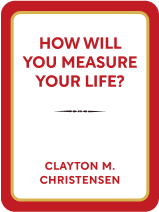

This article is an excerpt from the Shortform book guide to "How Will You Measure Your Life?" by Clayton M. Christensen. Shortform has the world's best summaries and analyses of books you should be reading.
Like this article? Sign up for a free trial here .
Do you find it hard to make decisions? What is the key to making better decisions?
Clayton Christensen shows how economic theories can help us with making better decisions in his book How Will You Measure Your Life? Find out why experience isn’t the best guide for your decisions and why you should use theories instead.
Keep reading to learn about making better decisions.
Making Better Decisions Using Theories
If you want to make good decisions in life, using theories might help. When making better decisions, people often try to predict what will happen based on as much data as they can gather; however, data only tells you what happened in the past. Letting it drive your choices is like driving a car by looking in the rearview mirror; you can’t see where you’re going.
Alternatively, you can base decisions on experience, but often, you don’t have time to learn on the job—for instance, to go through a couple of divorces to learn about relationships, or a couple of kids to master parenting.
In contrast, theories are more helpful in making better decisions because they tell you what will happen without you having to experience it first. This is key to knowing how to make good decisions in life. Good theories take the form of “if … then” statements (for example, if you don’t align your resources with your strategy, then your strategy will fail). You can see what actions cause what outcomes and why, then make a wise decision.
For example, developing a theory of lift was the key to humans learning to fly. Prior to this, people failed to fly because they didn’t understand causation. Since creatures with wings and feathers could fly (a correlation), early inventors tried building similar wings and jumping from high places, which failed. They didn’t understand what actually causes or enables flight until 1738, when mathematician Daniel Bernoulli presented a theory that explained how lift makes it happen.
Developing and refining further theories in the form of rules telling pilots what to do under different types of circumstances eventually made flight predictable and reliable.
Applying Theories to Decision Making
Similarly, solving problems in life requires understanding what actions cause what outcomes. The theories explained in this book will help you see cause and effect. They’re reliable—they stem from university research, which has been tested in a variety of organizations. Each chapter highlights a business theory and applies it to a personal challenge.
However, to solve a complicated problem, you may need the insights of more than one theory. For example, besides the theory of lift, early aviators also needed to understand the theories of gravity and resistance. So readers will find it useful to examine problems from the perspective of several different theories in the book.
Operating without a theory is like navigating at sea without directional instruments—you’re relying on the currents and chance. However, good theories point you in the direction of making better decisions in business and life. From there, it’s up to you. Theories tell you how to think about key decisions, not what to think. If you want to find out how to make good decisions in life, consider applying Clayton Christensen’s theories from How Will Your Measure Your Life?

———End of Preview———
Like what you just read? Read the rest of the world's best book summary and analysis of Clayton M. Christensen's "How Will You Measure Your Life?" at Shortform .
Here's what you'll find in our full How Will You Measure Your Life? summary :
- How economic theories that help businesses succeed can also help individuals make better life decisions
- How to build a career that makes you happy
- How to deepen your relationships with your spouse and children






